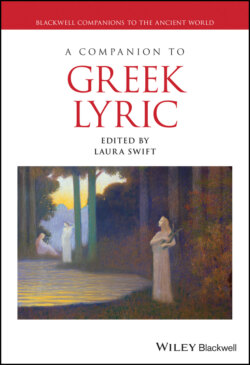Читать книгу A Companion to Greek Lyric - Группа авторов - Страница 31
I Epic and Elegy on War 1: Tyrtaeus
ОглавлениеSo we should not deny a constant interplay between the forms throughout the archaic period, especially but not only in places like Lesbos, which enjoyed strong local traditions of both epic and lyric poetry,5 though this chapter inevitably focuses more on the latter material. Such an interplay is particularly evident when epic and lyric poets treat the same theme, especially with the elegists, whose formal similarities with the epic tradition permit us to see them manipulating common themes, but in a more self-contained, contemporary direction.6 Take the contrast between old age and youth, in the context of violent death in battle, as found in the Iliad and the seventh-century Spartan elegist Tyrtaeus.7 In Homer (Il. 22.71– 76), Priam says that it is a fine thing for the young to die in battle, but shameful for the old to lie dead, so as to exhort Hector not to risk death by fighting Achilles: instead, he is to save himself for the good of the city. The comparison at first sight militates against his point; perhaps Priam is really contrasting the desire (or normative expectation) that the young should die in battle with the need to protect the old from the kind of violent end which the sack of Troy would—indeed will—entail. Nonetheless, a niggling impression of inconsistency remains, especially given that Tyrtaeus uses the same theme in a hortatory elegy (fr. 10.21–30 W): the poet here makes it clear that the death of an old man in battle is a shameful thing, following on from his call to the young specifically not to abandon their elders (15–20), while it is both laudable and beautiful for a youth to die there. The same theme as that in the Iliad is woven more directly into its surroundings, since its message is addressed to the young when exhorting them to fight in such a way that they not “love their lives” (18). Though important, the question of epic or elegiac priority is less crucial here than observing the greater specificity and self-contention of the lyric poem: it cannot rely on a wider narrative context, and must instead fill out its claim on the audience in a more direct, self-sufficient way.8
